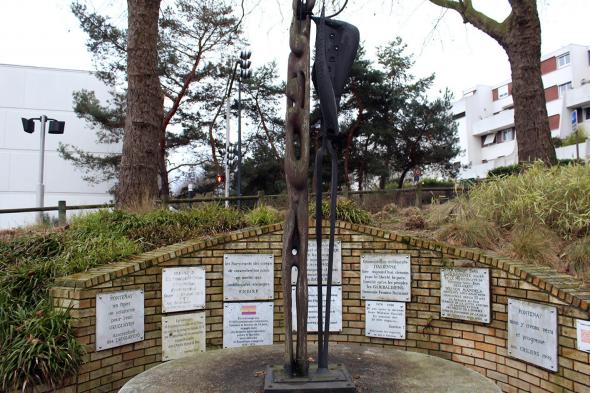The refusal of war and the colonial abyss
On one of the walls hangs the large, white, sculpted marble map that represents Portuguese explorations of the 15th and 16th centuries. A shaft of light illuminates Africa. We glimpse the shadow of Salazar, making his famous Braga speech of 1936 and declaring the indubitable trinity of God, the Fatherland, and the Family. So ends the exhibition that was open between April and May in the Casa de Portugal of the Cité Universitaire in Paris, Refuser la Guerre Coloniale [Refusing the Colonial War], organized by the associati Ângelo Ferreira de Sousa, and with texts by Victor Pereira, the exhibition is built on a diverse set of documents including journals, photographs, press releases and videos. These are presented in nine thematic chapters to tell a story that at once exceeds and is subsumed by the space-time marked out by the colonial war.
 Memorial 25 de Abril, Portugal da Liberdade, Fontenay-sous-Bois, France (wikimedia commons)
Memorial 25 de Abril, Portugal da Liberdade, Fontenay-sous-Bois, France (wikimedia commons)
The exhibition begins with objects through which Salazar’s Portugal deepened what the historian Valentim Alexandre has called “the myth of the sacred inheritance” (1). These emphasized the civilizing and Christianizing role of Portuguese colonialism. The exhibition then jumps to the theme of emigration, to show the continuities between so-called “economic emigration” and “political emigration”. This distinction itself does not always help to understand the social engagement and subpolitical resistance in which many emigrant groups were involved (2).
The figure of the passive, wellbehaved and a-political emigrant, which the work of Mémoire Vive has come to question, is confronted with the political, cultural and associative activity of the 1960s and 1970s, and the growing presence and pertinence of the colonial war. Journalistic work, the Committees of Deserters, local networks of militant solidarity, opposition groups in exile and African liberation movements are all put into dialogue to flesh out the socio-political framework of desertion, understood in an ample sense of actively refusing to be incorporated into the military and into the war.
The exhibition does not end, however, with the 25th of April and the return of the exiles and the deserters. Many of them, in fact, had to go through complicated processes of amnesty and regularization even in the democratic period. It is not, however, with these biographies that the exhibition concludes, but with an investigation into the remains of the colonial past in the post-colonial present. This elucidates how exile and desertion are subject to the friction of memory, and how they struggle for representation and recognition in public memory. Behind a screen lurks a room called Colonial Abyss, in which photograph albums, writing and objects explore the experience of war and the Portuguese colonial presence in Africa. This is the insistent backdrop to narratives of soldiers’ disaffection, and to the countercyclical history of the war that the exhibition seeks to evoke.
Mémoire Vive’s work, of which this exhibition and the associated colloquium are part (3), are one aspect of a recent emergence of historical research – along with memorializing and artistic projects – which has dealt with desertion and the rejection of war: for example the two volumes of testimonies from deserters, rebels and anti-colonialists collected in Exílios (2016) and Exílios 2 (2017), organized under the auspices of the Association of Portuguese Political Exiles (AEP 61-74). Indeed, the creation of AEP 61-74 in November 2015 marked a phase of greater visibility for memories of exile and desertion. The publication of these two books underpinned a varied set of debates and presentations on the theme, both in Portugal and abroad, as well as media reports and various academic and public discussions. This recent profusion does not mean that desertion has ceased to be what Enzo Traverso has called a “weak memory” (4). Desertion is still often seen as a morally and politically inadequate gesture, and recalling it as a dishonourable affront to the memory of war and its veterans. Indeed, the difficult subject of a politically null war and the traumatic end of the imperial cycle have tended to produce a memory of the colonial war which – though often stressing its “tragic” and “useless” dimension – still emphasizes participation in it as a question of duty. This casts the figure of the veteran as a victim, either of the “winds of history”, or as having been forced to fight. Yet in this exhibition’s framework, the memory of desertion furnishes an alternative mnemonic, based on the denunciation of violence and the injustice of war, and which puts forward new ways to articulate the relationship between political positions and moral values.
_________________________
(1) Valentim Alexandre (1995), “A África no Imaginário Político Português (Séculos XIX e XX)”, Penélope, n.º 15, pp. 39-52. (2) On this theme see Victor Pereira (2007), «Émigration, résistance et démocratisation. L’émigration portugaise au crépuscule de l’Estado Novo», Mélanges de la Casa de Velázquez, vol. 37, n°1. (3) Refuser le Silence, held on the 4th of May in the Casa de Portugal – Residência André de Gouveia, with the participation of Hugo dos Santos, António Oneto, Victor Pereira, Fernando Cardeira, Miguel Cardina, Silvy Crespo, Agnes Pellerin, Ângelo Ferreira de Sousa and Catarina Boieiro. (4) Enzo Traverso (2012), O Passado, Modos de Usar. Lisboa: Edições UNIPOP, pp. 71-87. _________________________
MEMOIRS is funded by the European Research Council (ERC) under the European Union’s Horizon 2020 research and innovation programme (no. 648624) and is hosted at the Centre for Social Studies (CES), University of Coimbra.